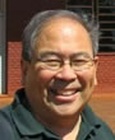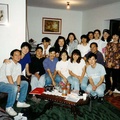The air was stifling.
Outside, the rain cooled the air to the low-90's. But the moisture raised the humidity to 100%. It was after midnight and I struggled to find a comfortable position in my cot. I had no blankets because of the heat. Only the sheet between me and the mattress.
There was no breeze.
I was in Belém do Pará in the heart of the Amazon. The setting was a boarding house north of the city. Called a "pensionato," it was a place created for the high-school-aged children of immigrant Japanese farmers working throughout the Amazon basin. These young adults came to the city of Belém for an opportunity to further their education. They were housed in this mission-sponsored dormitory.
Believe it or not, it was quite comfortable for what you might expect on the edge of one of the world's largest rainforests. Meals were provided three times a day. There were showers and flush toilets. There were paved concrete grounds for tennis, soccer, volleyball and other sports just outside. There was a television in the common room.
But what was to be done about the heat? They didn't have air conditioning.
It was inter-term. Many students were absent to be with their families in the surrounding farming towns and villages. I got out of bed and turned on the light. I looked back at my bed. I'd left the shape of my body on the sheets. A shadowy image that was formed by my own sweat. Yuck!
Experience told me that a simple solution for the problem would be a fan. A fan does two things: it keeps the air moving, so you have a sense of coolness. And second, when you turn the fan on yourself, the mosquitoes can't land on you for an overnight feast. I guess they can't land in a breeze. Or maybe they can't take off. I'm not sure.
I walked out into the common room. The kids were still awake watching some program, writing letters home. In my broken Portuguese I asked if there might be a fan available. What's the word for "fan?" How do you mimic a fan to make up for the inability to speak the language?
Unsurprisingly perhaps, these kids picked up on my incomprehensible gestures right away. A couple of them ran out the door, urging me to follow them. As I turned a corner down the hallway, they were already carrying a fan they had borrowed from a vacationing student and were heading toward my room. They set up the fan on a little stool. "Boa noite, pastor!" (Good night, pastor!)
As much as I struggled with the climate and the lack of amenities, I really appreciated those kids. And it's the same in most places, I suppose. It's not the place. It's the people.
It's the people who make your travel a memorable experience. Wouldn’t you say so?
© 2009 John Katagi






